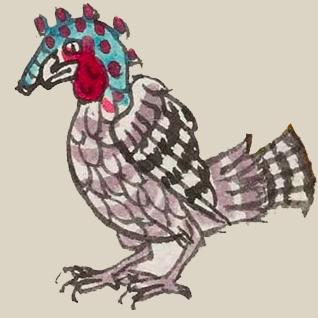huexolotl (Mdz16r)
This simplex glyph for turkey (huexolotl or huehxolotl) also represents the place name, Huexolotlan. The turkey (guajolote in Mexican Spanish), has mottled black and white feathers on its legs and body. The bird's head, however, if shown here as very colorful. It has a red throat, the head is turquoise blue, and it has small red balls scattered over the top of the head. Here is a photo of a Mexican turkey.
Stephanie Wood
The huexolotl was a tribute item, enjoyed for its substantial meat compared to other birds. The bird also had associations with Tetzcatlipoca and other divinities. The turkey hen could be called totolin or cihuatotolin. Alexander von Humboldt wrote: "New Spain has supplied Europe with the largest and most useful of domestic gallinaceous birds, the turkey (totolin or huexolotl) which was formerly found wild on the back of the Cordilleras, from the Isthmus of Panama to New England" (Political Essay on the Kingdom of New Spain, vol. 3, p. 55, of 1811).
Stephanie Wood
Stephanie Wood
c. 1541, but by 1553 at the latest
Stephanie Wood
huehxolotl, vesulotl, uexolotl, turkeys, turkey cock, turkey cocks, gallipavo, aves de corral, birds, guajolotes, fowl, feathers, ave, aves, pájaro, pájaros, pluma, plumas, animals, animales

huexolo(tl), a male turkey, https://nahuatl.wired-humanities.org/content/huexolotl
turkey cock
el guajolote o el pavo
Stephanie Wood
Codex Mendoza, folio 16 recto, https://digital.bodleian.ox.ac.uk/objects/2fea788e-2aa2-4f08-b6d9-648c00..., image 42 of 188.
The Bodleian Libraries, University of Oxford, hold the original manuscript, the MS. Arch. Selden. A. 1. This image is published here under the UK Creative Commons, “Attribution-NonCommercial-ShareAlike 3.0 License” (CC-BY-NC-SA 3.0).
